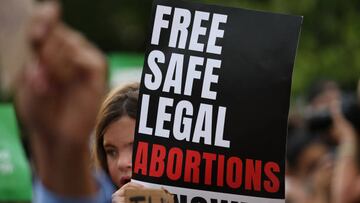What is the economic impact of the overturning of Roe v Wade?
The Supreme Court has reversed the constitutional right to abortion, a decision which increases financial hardship amongst women denied the procedure.

Numerous studies have suggested that one major consequence of the Supreme Court’s decision to overturn Roe v Wade is an increase in financial hardship for women. The Court’s ruling, announced on Friday, reversed the 49-year precedent for federal abortion rights in the United States.
Abortion has now been outlawed in some areas and up to 26 states are expected to ban abortion, or impose tough new restrictions, in the coming months. Women can still travel to other states to get the procedure, but the cost associated with interstate transit will make it prohibitively expensive for some.
Carolyn McClanahan, a Florida-based certified financial planner and founder of Life Planning Partners, explains: “It sadly affects the most marginalized women — women of color and people who are economically unable to access abortion.”
Some women could face huge expense to get an abortion
Already there are 21 states that have either pre-existing abortion laws or pending state-level bans, which will greatly reduce abortion access across the country. Many of these states are grouped together, particularly in the south, meaning that for many women they will not be able to get the treatment in a neighbouring states.
In reality they will likely have to travel far further, crossing through multiple states, and have to take time off work and away from other responsibilities. A study by NBC News found that women in those 21 states would have to drive, on average, four hours to reach their nearest abortion clinic.
Of course for some people in remote areas this would be even longer. Anyone living in Salt Lake City will have to make a 335 mile journey to Steamboat Springs, Colorado to reach the nearest open clinic.
By car that is at least a six-hour journey, but anyone who can’t afford a car would have to make a 19-hour public transport trip to get the treatment that had previously been a constitutional right.
Women unable to get abortions face increased risk of economic hardship
With so many financial and logistical barriers preventing women in certain states from getting an abortion, it will inevitably force some to keep pregnancies that they do not feel adequately equipped for.
There have been numerous studies into the economic ramifications of reduced access to abortions, most of which point to one main outcome: more women facing economic hardship.
A 2020 study from the University of Michigan found that women who had been denied an abortion experienced a 78% increase in debt and an 81% increase in the likelihood of bankruptcy and eviction in the five years that followed. Their credit score also fell, on average, and being forced to carry an unwanted pregnancy often brings huge disruption to career plans.
Another study conducted at the University of California found that “women who were turned away and went on to give birth experienced an increase in household poverty lasting at least four years relative to those who received an abortion”
One of the study’s authors, economics professor Caitlin Myers, described the impact of overturning Roe v Wade as “a big setback for women’s rights, both from a health and an economic standpoint.”






